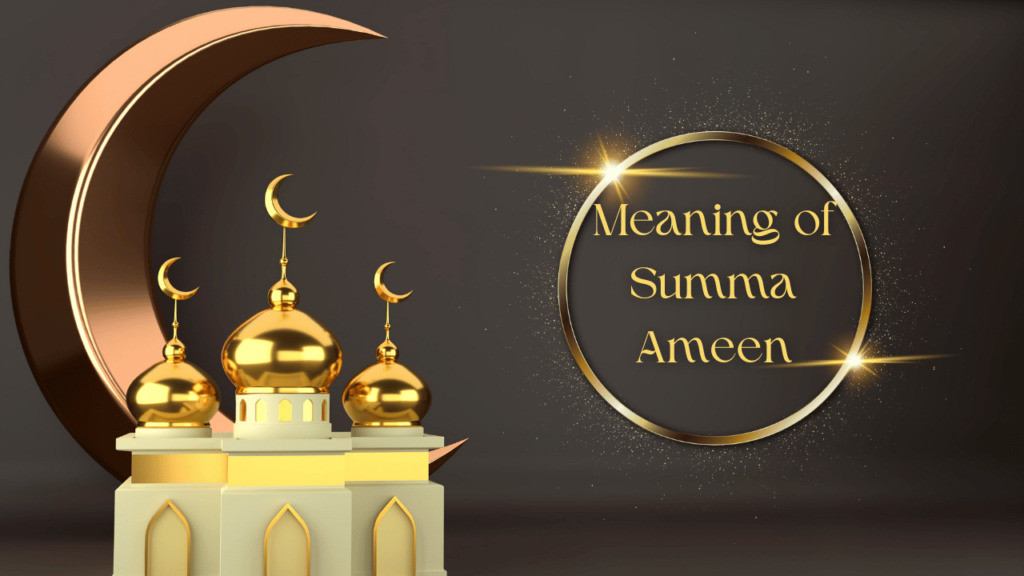Meaning of Summa Ameen – Exploring Significance and Usage
This article aims to shed light on the meaning of “Summa Ameen” and its relevance in Muslim traditions, offering a comprehensive understanding of its origins, usage, and spiritual significance.

Introduction:
In various cultures and religions, expressions and phrases hold deep meanings, reflecting values, beliefs, and spirituality. One such phrase that holds significance in the Islamic faith is “Summa Ameen.”
1. The Meaning of “Summa Ameen”
“Summa Ameen” is an Arabic phrase commonly used by Muslims during prayers and supplications. It is an expression that combines two words: “Summa” and “Ameen.” “Summa” means “then” or “so be it,” while “Ameen” translates to “O Allah, accept our prayers” or “Amen” in English.
What does summa ameen mean in english?

In English, the phrase “Summa Ameen” translates to “So be it, O Allah” or “O Allah, accept our prayers.”
Summa Ameen meaning in arabic

In Arabic, the phrase “Summa Ameen” is written as “سُمَّا امِينَ.” It combines two words:
- “سُمَّا” (Summa): It means “then” or “so.”
- “امِينَ” (Ameen): It is derived from the root “أ-م-ن” and translates to “O Allah, accept our prayers” or “O Allah, hear us.” It is an affirmation used at the end of supplications or prayers to express the belief and hope that Allah will accept the prayer.
Together, “سُمَّا امِينَ” (Summa Ameen) signifies a declaration of affirmation, trust, and the desire for Allah to accept the supplication or prayer.
Summa Ameen meaning in HINDI

The phrase “Summa Ameen” is primarily used in the Arabic language within the context of Islamic prayers and supplications. However, if we were to approximate its meaning in Hindi, it can be understood as:
“Summa” does not have a direct translation in Hindi, but it can be loosely interpreted as “फिर” (phir), meaning “then” or “again.”
“Ameen” can be translated as “आमीन” (aameen) or “आपकी मनोकामना पूर्ण हो” (aapki manokamana poorn ho), both conveying the sense of “may your wish be fulfilled” or “may your desire be granted.”
So, in Hindi, the approximate meaning of “Summa Ameen” would be “फिर आमीन” (phir aameen) or “फिर आपकी मनोकामना पूर्ण हो” (phir aapki manokamana poorn ho), expressing the wish for the fulfillment of a desired outcome.
Summa Ameen meaning in URDU

In Urdu, the phrase “Summa Ameen” is written as “سمہ امین”. It holds the same meaning as in Arabic and is commonly used in Islamic prayers and supplications.
“سمہ” (Summa) is an Arabic word that translates to “پھر” (phir) in Urdu, meaning “then” or “again.”
“امین” (Ameen) is an Arabic word that is widely adopted in Urdu as well. It signifies “آمین” (Aameen) in Urdu, which is used as an affirmation at the end of prayers or supplications, expressing the belief and hope that Allah will accept the prayer.
So, in Urdu, “سمہ امین” (Summa Ameen) can be understood as “پھر آمین” (phir aameen), signifying a reaffirmation and a sincere desire for the acceptance of the supplication or prayer by Allah.
Read Also “Mashallah Tabarakallah“
“Ameen Summa Ameen” meaning
The phrase “Ameen Summa Ameen” is a combination of two commonly used expressions in the Islamic faith.
- “Ameen”: It is an Arabic word derived from the root “A-M-N,” which means to believe, affirm, or accept. In English, it is often translated as “Amen.” Muslims say “Ameen” at the end of prayers or supplications as an affirmation and a way to express their agreement with the prayer’s content. It signifies a sincere desire for Allah to accept and fulfill the prayer.
- “Summa”: It is an Arabic word that means “then” or “so.” It is used to indicate a sequence or continuation in speech.
When combined, “Ameen Summa Ameen” can be understood as an extended affirmation of a supplication or prayer. It emphasizes the belief that the prayer has been made with sincerity and concludes with a strong affirmation that the prayer’s content is in accordance with the individual’s wishes and in alignment with the will of Allah.
2. Origins and Historical Significance
The phrase “Summa Ameen” holds its roots in the Islamic tradition and can be traced back to the time of the Prophet Muhammad (peace be upon him). It is believed that the Prophet used this expression during his prayers to emphasize the completion and acceptance of supplications.
3. Usage in Prayers
“Summa Ameen” is predominantly used at the end of a prayer or supplication, after the recitation of a request or desire. Muslims employ this phrase as a way to affirm their belief in the acceptance of their prayers by Allah (God). By uttering “Summa Ameen,” individuals acknowledge that they have submitted their requests to the Almighty and express their trust in His mercy and compassion.
4. Spiritual Significance
Beyond its linguistic meaning, “Summa Ameen” holds deep spiritual significance in the lives of Muslims. It serves as a reminder of the importance of sincere supplication and reliance on Allah’s guidance. The phrase acts as a bridge between the human heart and the divine, symbolizing the connection and communication between the worshipper and the Creator.
5. Emotional Impact
Reciting “Summa Ameen” can evoke a range of emotions and feelings in the hearts of Muslims. It represents a moment of vulnerability and surrender to the will of Allah, fostering a sense of peace, contentment, and trust. The act of saying “Summa Ameen” reinforces the belief that Allah listens to the prayers of His servants and responds to their needs in the best possible way.
6. Cultural and Global Usage
“Summa Ameen” transcends geographical boundaries and is used by Muslims around the world, regardless of their native language. It serves as a unifying expression, connecting Muslims from diverse backgrounds in their shared devotion and faith. The phrase resonates with the global Muslim community, fostering a sense of unity and belonging.
Conclusion
In the rich tapestry of Islamic traditions, the phrase “Summa Ameen” holds a profound meaning. It signifies the completion and acceptance of prayers, invoking a sense of connection and reliance on the Divine. As Muslims utter these words, they reinforce their trust in Allah’s mercy and reaffirm their commitment to leading a spiritually fulfilling life. “Summa Ameen” serves as a powerful reminder that, ultimately, all supplications are subject to the will of Allah, and His wisdom guides the outcomes.
Faqs about “Summa Ameen”
What does “Summa Ameen” mean?
“Summa Ameen” is an Arabic phrase commonly used by Muslims during prayers and supplications. It can be translated as “So be it, O Allah” or “O Allah, accept our prayers.”
Is “Summa Ameen” specific to any particular Islamic prayer?
No, “Summa Ameen” is not specific to any particular Islamic prayer. It is a general phrase used at the end of various supplications and prayers to affirm belief in their acceptance by Allah.
Can “Summa Ameen” be used outside of formal prayers?
While “Summa Ameen” is commonly used within the context of formal prayers, it can also be used outside of prayers in a broader sense to express agreement or affirmation, similar to how “Amen” is used in Christian traditions.
What is the significance of saying “Summa Ameen”?
Saying “Summa Ameen” holds spiritual significance for Muslims. It symbolizes the completion and acceptance of prayers, signifying a connection between the worshipper and Allah. It also reflects trust in Allah’s mercy and His ability to fulfill the supplicant’s requests.
Can “Summa Ameen” be said silently or must it be spoken aloud?
There is flexibility in the practice of saying “Summa Ameen.” It can be said silently within oneself or spoken aloud depending on personal preference and the cultural practices followed in different Muslim communities.
Are there variations or alternative phrases to “Summa Ameen”?
While “Summa Ameen” is the most common form, variations or alternative phrases with similar meanings can be found in different Muslim cultures and languages. These variations may include additional words or phrases that convey the same affirmation and desire for acceptance of prayers.
Can non-Muslims use the phrase “Summa Ameen”?
There are no specific restrictions on non-Muslims using the phrase “Summa Ameen.” However, it is important to understand the cultural and religious context in which it is traditionally used and to use it respectfully and appropriately if employed outside of one’s own faith tradition.
Is there a specific time or situation when “Summa Ameen” should be said?
“Summa Ameen” is typically said at the conclusion of prayers or supplications. It is not limited to any specific time or situation, as it can be used whenever a supplication or prayer is made.
Does saying “Summa Ameen” guarantee that a prayer will be answered?
While saying “Summa Ameen” expresses the belief in the acceptance of prayers, it does not guarantee that a specific prayer will be answered in the exact manner requested. Muslims believe that Allah responds to prayers according to His wisdom and what is best for the supplicant.
Can “Summa Ameen” be translated into languages other than Arabic?
Yes, “Summa Ameen” can be translated into other languages to convey its meaning. However, the original Arabic phrase is often retained, as it holds religious and cultural significance within the Islamic tradition. Translations may vary slightly depending on the language and cultural nuances.